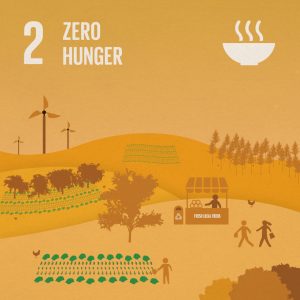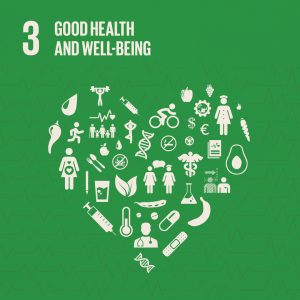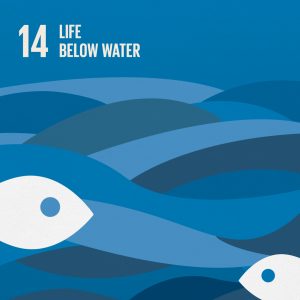By Bella Wright
Food is essential to the survival of all living beings on our planet. How this food is grown, processed, and distributed significantly impacts the environment. Auburn University has extensive dining services across campus, offering a variety of choices for nutrition and dining. Where food on campus is sourced, and how it is managed and served, impacts the environment. It is important to reflect on how Auburn University is sourcing its food on campus and the current impact of our dining practices to evaluate our overall environmental, social, and economic impact.
The STARS* assessment aligns with the United Nations Sustainable Development Goals (SDGs):
Goal 2: End hunger, achieve food security and improved nutrition, and promote sustainable agriculture
Goal 3: Ensure healthy lives and promote well-being for all at all ages
Goal 12: Ensure sustainable consumption and production patterns
Goal 14: Conserve and sustainably use the oceans, seas, and marine resources for sustainable development
Goal 15: Protect, restore, and promote sustainable use of terrestrial ecosystems, sustainably manage forests, combat desertification, and halt and reverse land degradation and halt biodiversity loss
Subcategories
- Food & Beverage Purchasing: This credit evaluates the extent to which institutions support sustainable food systems through their food and beverage purchases. Actions taken to reduce the social and environmental impacts of food production are evaluated.
- Auburn’s Score: 0.65/6.00
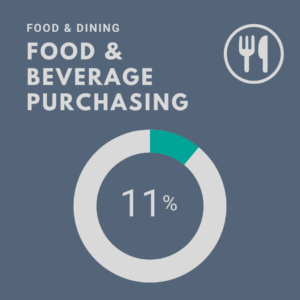
- Auburn’s Score: 0.65/6.00
- Sustainable Dining: This credit evaluates how sustainably an institution operates its dining services. This includes minimizing food waste, making low-impact dining options available, and engaging the community around sustainability issues.
- Auburn’s Score: 1.43/2.00
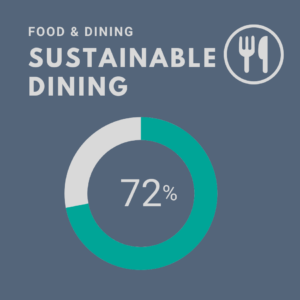
- Auburn’s Score: 1.43/2.00
Reflections
Auburn’s score in the Food and Beverage Purchasing category reflects a significant opportunity for growth. Only 2.73% of the total annual food and beverage expenditures from August 2019 to July 2020 were on sustainably sourced or ethically produced products. However, 16.34% of the total annual food and beverage purchases were on plant-based food. This reflects an increase in plant-based options on campus compared to previous evaluation cycles. To increase our scores in this subcategory, Auburn University’s primary food service provider could increase the amount of plant-based food options offered on campus. Also, it could focus its purchasing for campus dining halls and catering services on ethically sourced products in major categories such as meat, dairy, poultry, seafood, eggs, fruits and vegetables, baked goods, and beverages (coffee, tea, soft drinks, etc.).
Auburn’s score in the Sustainable Dining category reflects progress and efficiency in multiple areas of sustainable dining. Sustainable dining initiatives and food waste minimization and recovery are both evaluated to create the overall score in this subcategory. Auburn University’s sustainable dining initiatives include the College of Agriculture’s open-air, growers-only farmers market as well as the community garden, sustainability picnic, and plant-forward meal options on campus via Food U. In on-campus dining facilities, Campus Dining also provides reusable cups and silverware, reducing waste. It is important to recognize Auburn University’s many strides to make a positive impact in this category. While much progress has been made, there is always room to grow. To increase our score in this category, a vegan dining program could be introduced. Additionally, Auburn could implement a composting program to reduce food waste and introduce compostable to-go containers at all facilities.
Overall, Auburn University has made many improvements to create a positive impact through food and dining services. However, there is still a need to shift toward more sustainable, ethical purchasing. In the future, where our food is being purchased from and how it was created should be a significant priority when purchasing goods. To find out more about current sustainability efforts, view Auburn University’s STARS report in this category and visit the Campus Dining page.
*The Sustainability Tracking, Assessment, and Rating System (STARS) program is a self-reporting framework for institutions of higher education to track their sustainability performance created by the Association for the Advancement of Sustainability in Higher Education. Overall, STARS is made up of 211 possible points in 64 different subcategories. The subcategories are grouped by Academics, Engagement, Operations, and Planning & Administration. Additionally, participants may receive extra points for exemplary and innovative practices. In this summary, our score is shown over the amount of possible points for each credit. View Auburn University’s 2022 STARS Report for more details.
Learn about the SDGs & AU and our contributions related to this post.
